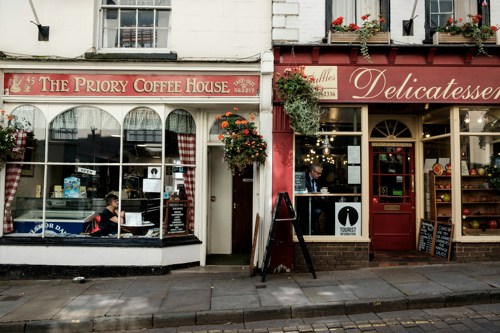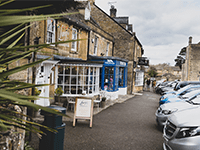
Are you wanting to buy or refinance a property that has residential and commercial uses? If so, understanding mixed-use mortgages will be key.
This blog gives an overview of this option, helping you decide if it aligns with your plans. Whether you're exploring eligibility, loan sizes, or interest rates, this blog covers it all.
What are mixed-use mortgages?
A mixed-use mortgage is a type of loan that allows you to buy or refinance a property with both residential and commercial uses.
Also known as a semi-commercial mortgage, it's ideal for business owners who need to buy a property that meets both their living and commercial needs. It's also good for landlords looking to invest in profitable properties that can provide multiple sources of income.
What counts as a mixed-use property?
A property may be considered mixed-use if the living area is no more than 40% of the total space. If the residential part exceeds this, the property would be considered residential rather than mixed-use.
So, if you have a house with a small shed in the garden used as a salon, it would likely be considered residential since most of the property is used for that purpose.
Some examples may include:
- A bed and breakfast with living space for staff
- Holiday parks with living space
- A shop, salon or pub with a flat above it
- A farm with a residential house and land for farming operations
As shown by these examples, a wide range of property types can be considered mixed-use, making these mortgages a valuable funding option.
How to get a mixed-use mortgage
You have two main options when you are looking to apply. Either you can go directly to a lender/bank or you can use a broker.
Each option has its pros and cons, and the best choice depends on your needs and how much time you have to research products.
Directly to a lender or bank
If you've found a product that meets your needs, you can approach a lender or bank directly. This option can be more cost-effective as it removes any broker fees. However, it limits you to the provider’s specific products. This means if you don't meet their criteria, you won't have other options to explore with them, potentially reducing your chances of getting a mortgage.
Exploring other options later could mean starting again. Also, be mindful of applying for multiple types of financing within a short period. Lenders conduct credit checks when you apply, and numerous hard searches can lower your credit score. This can impact your ability to get finance elsewhere.
Using a broker
A broker has access to a broader range of mixed-use mortgage lenders, so they can help you assess and compare different solutions. To add to this, brokers can find lenders who are more likely to approve your application and can exclusively recommend these providers, boosting your chances of finding a product.
However, because brokers invest time in processing your application and assisting you, they typically charge a fee for their services. When you combine these fees with lender charges, this option can be more expensive.
When you’re applying, it's good to assess your options carefully to decide the best route for you. Take the time to consider all the possible costs involved, including lender and broker fees, as well as expenses like valuations, legal fees, insurance, early repayment charges, and exit fees. This will help you make an informed decision about what's best for you.
Am I eligible for a mixed-use mortgage?
Eligibility depends on various factors, and the criteria can also vary between lenders. Therefore, a definite answer is hard to give without starting the application process.
Some key factors that lenders consider include:
- Your income and outgoings: Lenders need to be confident that you can afford the loan and will be able to make repayments. They will check your finances to make sure the loan is affordable for you.
- Credit history: Your credit history gives lenders an overview of how you manage your current and past financial commitments. A bad credit history can make approval harder, while a good history can improve your chances.
- Business performance: Since part of the property will be used for commercial purposes, lenders may check the stability and performance of your business. They want to make sure your business is stable to reduce the risk of you defaulting on the loan.
If you meet the lender's criteria and satisfy all these factors, you may be eligible and ready to proceed with your plans.
How much can I borrow for a mixed-use property?
The amount you can borrow for a mixed-use property varies based on the lender and your personal circumstances. Some lenders don't have a maximum loan size, allowing you to borrow a substantial amount if you meet their criteria and can show you would be able to repay.
One key factor that may influence the loan amount is the loan to value (LTV) ratio. Generally, lenders will lend up to 75% of the property's value. However, in some cases, they may allow you to borrow more.
To see how much you can borrow, it's best to speak with lenders or brokers who can provide advice based on your situation.
What are the interest rates on mixed-use mortgage loans?
Mixed-use mortgage rates vary depending on the lender and your circumstances. If a lender sees you as more risky, they might charge a higher interest rate to offset that risk. On the other hand, if you're seen as less risky, you could get a lower rate.
The Bank of England base rate also affects these rates. When the base rate goes up, interest rates usually follow suit. When it goes down, interest rates generally decrease as well.
Summary
In summary, a mixed-use mortgage offers a valuable option for business owners looking to buy or refinance properties that have both residential and commercial elements. They can help with a range of property types and are accessible by going directly to lenders or mortgage brokers. This guide has explored key aspects of this area to help you assess if this solution aligns with your needs.
Any property used as security, which may include your home, may be repossessed if you do not keep up repayments on your mortgage.




